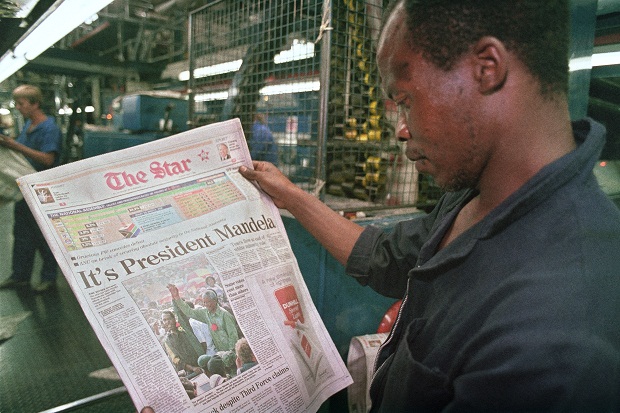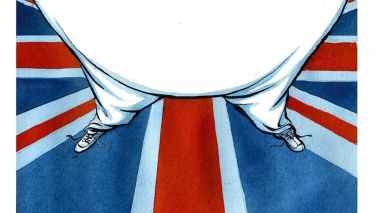This week South Africa has held events to mark 20 years of democracy. Simon Jenkins, writing after the first election that included black people, was deeply moved:
Democracy is an unromantic ideology, but the old girl can still draw a tear. I have never witnessed a political event to compare with the South African election, not even the fall of the Berlin Wall. The silent queues snaking for miles across bush and township were mesmeric…Streets that saw gunfights, burnt homes and necklaced corpses were graced with orderly lines in their Sunday best…
Twenty-five million blacks got up one morning, and decided to put their faith in democracy. Nobody foretold this. Nobody imagined South Africa would go to the polls on a universal franchise in 1994, experience no boycott and no violence beyond what Chicago sees in an average weekend. Yeats should have been there. This was the centre holding. This was the ceremony of innocence undrowned in blood.
But he was already worried about the economy. South Africa had outperformed other African economies for the last 20 years but the newly elected ANC had a Socialist agenda. If it didn’t go well, they would have a ready-made defence:
Apartheid will be a pearl without price. It will be the Great Excuse…Politically correct academics claim white rule held South Africa back by stifling black education and advancement. I don’t believe it. Apartheid may have been crude and cruel, but it was no more than an elite entrenching its economic power. The ‘trickledown’ worked. The incomes of blacks were well above those elsewhere on the continent, which explained the heavy migration of blacks into South Africa throughout the apartheid period. As Third World economies go, South Africa was a thundering success. The massive redistribution of wealth promised by the ANC threatens that success. So a reason for incipient failure must be found in advance.
Andrew Kenny expressed similar concerns a few months later. The ANC had an entrenched belief that wealth is to be taken and distributed by government rather than made, he argued. While the ANC was busy redistributing wealth and advertising highly paid government jobs, few people seemed to be interested in doing any actual work.
The blacks want to sit back and be recompensed handsomely for the years of oppression under apartheid. Among the whites, any feelings of guilt are limited to a tiny handful of academics and novelists; the vast majority, far from feeling guilty about apartheid, feel aggrieved that they have had to carry the white man’s burden for so long. Now that they have laid it down and generously conceded power to the blacks, they expect to sit back and be rewarded. So neither black nor white wants to work.
Ten years later, Kenny was even gloomier than before. He’d always believed that once the race problems were ironed out, South Africa would flourish. But by 2004, things were looking bleak. Aids, unemployment and violent crime were rampant, and he was appalled by the government’s insistence on racial quotas for all employers.
Looking back over the two eras, I see a horrible continuity between apartheid and ANC rule. Both the National party and the ANC had strong socialist instincts before coming to power, and a desire to nationalise the economy. Neither did so in government, both choosing instead a corporatist or fascist approach, in which the big corporations and trade unions were co-opted into arrangements with the state on the running of the economy. Both believe in an all-powerful state that must control every aspect of life. And of course both are obsessed with race, their all-consuming ideology.
The economy is held in a strangling grip by the government, a few large corporations and the big trade unions. In true fascist style, the three have come together to draw up highly restrictive labour laws, which cripple small businesses and shut the poor out of the economy. The result is massive unemployment, grinding poverty for the masses and sumptuous wealth for the lucky few. Under apartheid there was laughter at racial classification. Today the racial classification remains, but the laughter has died.
The Spectator also kept a close eye on South Africa’s attitude to its neighbour Zimbabwe. Andrew Meldrum, who had been kidnapped by Mugabe’s secret police and illegally forced out of the country, wrote an article entitled ‘Drowning in Denial’ soon after the tenth anniversary of democracy.
I found it difficult to watch all the self-congratulatory hoopla and pomp in April when South Africa celebrated its tenth anniversary of majority rule on the same day that President Thabo Mbeki was inaugurated for a second five-year term. Robert Mugabe — the dictator who has systematically dismantled Zimbabwe’s democracy, destroyed the economy and caused untold suffering — received a hero’s welcome. South Africa’s political elite gave him a standing ovation with clenched fist salutes. A fury of frustration welled up inside me as I watched the celebrations on television…They applaud Robert Mugabe for spitting in the eye of the old colonialist, and overlook the fact that he has sacrificed Zimbabwe’s economy and the rights of his people just to hold on to power.
Unemployment in South Africa is now at 36%, which is higher than in 2000, when Simon Freeman took a tour of Soweto with a reformed criminal, ‘so distracted by his own jokes that he veered crazily from lane to lane as he drove his minibus full of tourists through the centre of Johannesburg’. The guide explained to his audience that everyone in the township had a BMW because they were so easy to steal. Guard dogs were no problem because you could just shoot them. It was in townships like these – mazes of tin, shared toilets and scrap – where the future of South Africa would be decided, he said, “angry and bloody, or pragmatic and peaceful”.
South Africans are getting angry. There are regularly violent protests about corruption and poor public services; police shot dead 34 miners during a strike in 2012 and there are more strikes going on at the moment. President Jacob Zuma recently spent $25 million of public money on home improvements, but when the country holds elections on 7th May, he’ll be voted back in. As with every other election since 1994, the ANC, the party that came to power on a surge of goodwill 20 years ago, is sure to win.






Comments